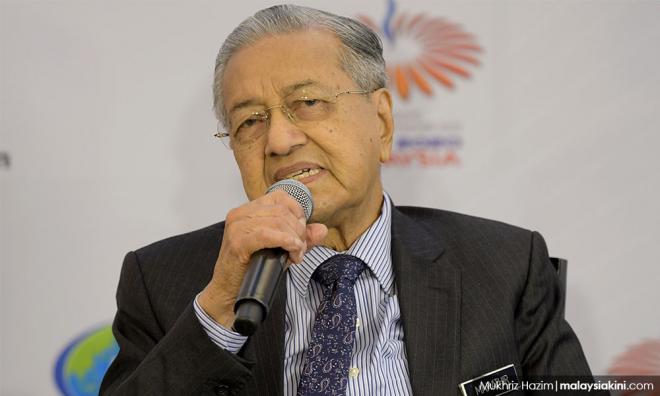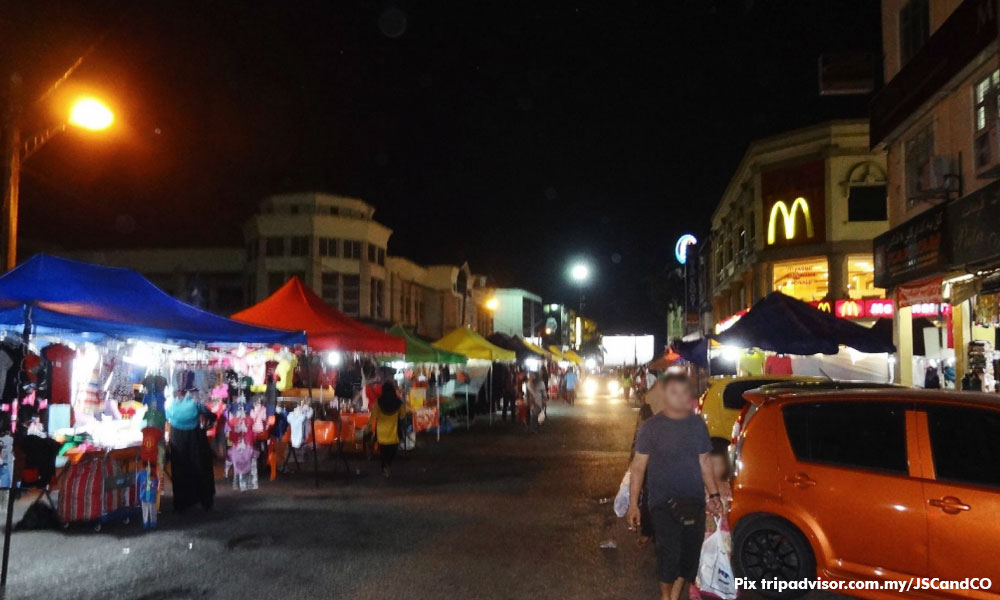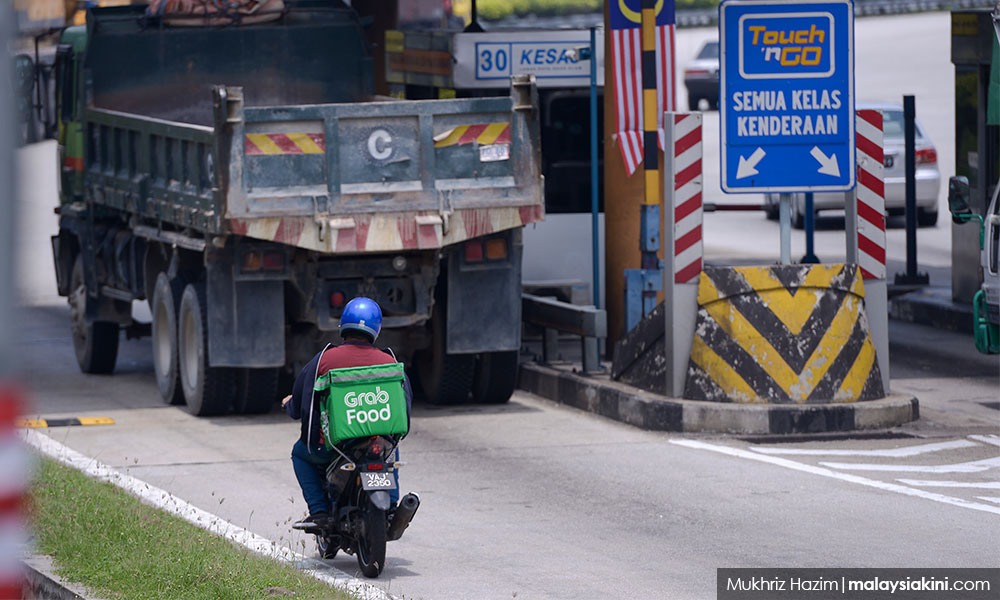Malaysiakini:
 |
by P GUNASEGARAM
Dear Dr M,
I read with consternation and dismay how you urged civil servants to help lift sections of the rakyat out of poverty. Here’s the gist of what you said, from Malaysiakini:"Do not wait for the government's assistance as this would make us dependent on the government, and those who depend on the government, surely they are not in a secure spot. On the contrary, they would be able to increase their income through their own efforts.
"This is what the government officers need to inform the rakyat (people) from the poor community, why they need to work hard to address their problems and not to depend on financial aid from the government."
I appreciate what you are trying to do - to get the poor to do something about their own state, but they have also been badly let down by previous governments, including your own previous 22-year stint as PM.
During this period, the New Economic Policy or NEP, introduced post the racial riots in 1969, focused much more on bumiputera ownership of corporate wealth, with less emphasis on the two key prongs, which are eradication of poverty irrespective of race and eliminating the identification of race with occupation.
The NEP also clearly stated that redistribution of wealth, which benefited the rich bumiputeras, was to come out of increased wealth. This was blatantly disregarded when, routinely, large firms had to divest up to 30 percent of their equity to bumiputera investors nominated by the International Trade and Industry Ministry - the beginnings of the politics of patronage.
The NEP also clearly stated that redistribution of wealth, which benefited the rich bumiputeras, was to come out of increased wealth. This was blatantly disregarded when, routinely, large firms had to divest up to 30 percent of their equity to bumiputera investors nominated by the International Trade and Industry Ministry - the beginnings of the politics of patronage.
This, and other similar things saw the rise of a wealthy Malay upper and middle class, but those further down the ladder did not benefit as much from the huge increase in economic growth since independence, which exceeded eight percent in most years.

Dear Dr M, to get a grip on the poverty problem, poverty needs to be redefined and quantified, and a plan and programme of action activated to systematically tackle this problem. Here are some measures which should be taken.
1. Establish the right poverty level. We all know that the government-set poverty level of just under RM1,000 per household per month is ridiculously low - five people living on just over RM30 a day, including rental - you’ve got to be kidding. No wonder poverty is officially non-existent. You need to have a handle on the problem if you want to solve it. If you go by the government-set poverty level, we have no problem.
2. Pay fair wages for labour. Next look at our minimum wage level - RM1,100 a month. Even that is not followed by an estimated 30 percent of employers. You may not be able to increase this to a fair level immediately, but surely you can increase this figure, say, by about RM100 per month every year to reach, say, RM1,500 in five years. Remember, no matter how hard the salaried worker works, he can’t increase his wages.

3. Restrict and eventually stop foreign labour. Dear Dr M, you were directly responsible for this when you allowed untrammelled import of Indonesian labour into the plantation sector in the Eighties. Predictably, it spilt over into other sectors, severely reducing the wages of Malaysian labour. You must have a plan for stopping the import of foreign labour, say over five years. If you don’t do this, the price of Malaysian labour will forever be depressed.
4. Focus on increasing wealth, not redistributing it. Why are you still obsessed with creating rich bumiputera? When you do other things, they will become rich. There are state-owned institutions that will keep wealth in trust for them, instead of cashing out, as many of them did when they were given that 30 percent. Focus instead on growing the wealth of the country and ensuring that every person in the line of production gets a fair cut. It’s clear that employers are getting too much, so that even as we create billionaires, the gap between the rich and poor is widening.
5. Encourage investments which have more value-added. Both local and foreign investments which are more capital and skills intensive need to be encouraged. Assembly industries with imported cheap Bangladeshi labour, for instance, much of it illegal and even trafficked, does nothing for the country, except for the bulging pockets of the already rich.
6. Remove the impediments to investment - big or small. Go to the ground and talk to small businesses - your corner shop, the neighbourhood cafe, the nasi lemak stalls. Ask them about the many layers they have to grease to merely make an income. And then unleash the MACC to get rid of these blood-sucking leeches. Concurrently, streamline procedures, put in place specific conditions to fulfil and once they are fulfilled, make sure approvals are given.
7. Encourage small entrepreneurship. Remember, food is big business A good cook will never go hungry because you can sell your food. Give housewives small loans to set these up and ensure there are no kickbacks. What about homestays and the like? They can also promote tourism. Also, think in terms of arts and crafts.

8. Allow the gig economy to take root. The gig economy, which harnesses idle human and other resources to provide economic functions, should be allowed to take root and blossom without bureaucratic hindrances. Look at the controls put on ride-hailing and food delivery. Dear Dr M, have you seen who is most affected by these restrictions? Why are your ministers such as Anthony Loke so bent on regulating them? This is the future. Just ensure the playing field is level and there is no exploitation so that people can get extra income from their own labour and assets such as cars, motorbikes and houses. The gig economy is the future - embrace it now.
9. Remove protective taxes. Just because of your Proton and other national cars, we have to pay two to three times for cars, bikes and trucks compared to other countries. Our cars are more expensive than those in the US, Europe and Australia. Why? Imagine the cost to all of those poor people and the disposable income you can release. You need to remove all protective taxes so we can benefit from the low cost of production elsewhere. And you need to encourage industries which have a comparative advantage that can compete on the world stage. You need to plug into everything good the world economy has to offer.
10. For goodness sake, improve the quality of education. This, although No 10, is probably the most important. Successive governments, including yours two times over, have only paid lip-service to this. Make it relevant, make it good - do the basics such as reading, writing and arithmetic and put in a proper dose of English to improve assimilation of skills - most cutting edge work is done in English. Don’t listen to the language extremists, be they Malay, Chinese or Tamil. Recognise the importance of English. Put a lot of emphasis on teacher training and move to full session schools. This section deserves a whole comment all to itself.
Dear Dr M, if you are really interested in doing something solid about alleviating poverty, you must implement every single one of these measures suggested and then some more. If you have done these, then you will be entitled to criticise the poor for not working hard enough.
Not until then.

Dear Dr M, to get a grip on the poverty problem, poverty needs to be redefined and quantified, and a plan and programme of action activated to systematically tackle this problem. Here are some measures which should be taken.
1. Establish the right poverty level. We all know that the government-set poverty level of just under RM1,000 per household per month is ridiculously low - five people living on just over RM30 a day, including rental - you’ve got to be kidding. No wonder poverty is officially non-existent. You need to have a handle on the problem if you want to solve it. If you go by the government-set poverty level, we have no problem.
2. Pay fair wages for labour. Next look at our minimum wage level - RM1,100 a month. Even that is not followed by an estimated 30 percent of employers. You may not be able to increase this to a fair level immediately, but surely you can increase this figure, say, by about RM100 per month every year to reach, say, RM1,500 in five years. Remember, no matter how hard the salaried worker works, he can’t increase his wages.

3. Restrict and eventually stop foreign labour. Dear Dr M, you were directly responsible for this when you allowed untrammelled import of Indonesian labour into the plantation sector in the Eighties. Predictably, it spilt over into other sectors, severely reducing the wages of Malaysian labour. You must have a plan for stopping the import of foreign labour, say over five years. If you don’t do this, the price of Malaysian labour will forever be depressed.
4. Focus on increasing wealth, not redistributing it. Why are you still obsessed with creating rich bumiputera? When you do other things, they will become rich. There are state-owned institutions that will keep wealth in trust for them, instead of cashing out, as many of them did when they were given that 30 percent. Focus instead on growing the wealth of the country and ensuring that every person in the line of production gets a fair cut. It’s clear that employers are getting too much, so that even as we create billionaires, the gap between the rich and poor is widening.
5. Encourage investments which have more value-added. Both local and foreign investments which are more capital and skills intensive need to be encouraged. Assembly industries with imported cheap Bangladeshi labour, for instance, much of it illegal and even trafficked, does nothing for the country, except for the bulging pockets of the already rich.
6. Remove the impediments to investment - big or small. Go to the ground and talk to small businesses - your corner shop, the neighbourhood cafe, the nasi lemak stalls. Ask them about the many layers they have to grease to merely make an income. And then unleash the MACC to get rid of these blood-sucking leeches. Concurrently, streamline procedures, put in place specific conditions to fulfil and once they are fulfilled, make sure approvals are given.
7. Encourage small entrepreneurship. Remember, food is big business A good cook will never go hungry because you can sell your food. Give housewives small loans to set these up and ensure there are no kickbacks. What about homestays and the like? They can also promote tourism. Also, think in terms of arts and crafts.

8. Allow the gig economy to take root. The gig economy, which harnesses idle human and other resources to provide economic functions, should be allowed to take root and blossom without bureaucratic hindrances. Look at the controls put on ride-hailing and food delivery. Dear Dr M, have you seen who is most affected by these restrictions? Why are your ministers such as Anthony Loke so bent on regulating them? This is the future. Just ensure the playing field is level and there is no exploitation so that people can get extra income from their own labour and assets such as cars, motorbikes and houses. The gig economy is the future - embrace it now.
9. Remove protective taxes. Just because of your Proton and other national cars, we have to pay two to three times for cars, bikes and trucks compared to other countries. Our cars are more expensive than those in the US, Europe and Australia. Why? Imagine the cost to all of those poor people and the disposable income you can release. You need to remove all protective taxes so we can benefit from the low cost of production elsewhere. And you need to encourage industries which have a comparative advantage that can compete on the world stage. You need to plug into everything good the world economy has to offer.
10. For goodness sake, improve the quality of education. This, although No 10, is probably the most important. Successive governments, including yours two times over, have only paid lip-service to this. Make it relevant, make it good - do the basics such as reading, writing and arithmetic and put in a proper dose of English to improve assimilation of skills - most cutting edge work is done in English. Don’t listen to the language extremists, be they Malay, Chinese or Tamil. Recognise the importance of English. Put a lot of emphasis on teacher training and move to full session schools. This section deserves a whole comment all to itself.
Dear Dr M, if you are really interested in doing something solid about alleviating poverty, you must implement every single one of these measures suggested and then some more. If you have done these, then you will be entitled to criticise the poor for not working hard enough.
Not until then.


Ya , really stupid of Anthony Loke to pander to the Taxi monopolies by imposing regulation on top of regulation to the E-hailing services.
ReplyDeleteThe taxi operators have absolutely made no attempt to improve their services, and no incentive to do so - just rentiers.
the ehailing n taxi follow a diff set of rule, i listen to both side argument, cant tell who is more right, taxi driver demand the same rule apply to all, r they being unreasonable? monopolies from either side is bad, thus allow fair competition is perhaps a good solution, but u cant have fairness when there is diff set of rule. ehailing suppose to be a additional income for those part timers, however most ehailing operator hire full time taxi driver since they can escape govt ruling on taxi, most countries face the same issue, i think anthony oso pening kepala.
DeleteWakakakaka…
DeleteU want fair competition in a workable marketing economy?
Just follow what is been done in CCP China with Didi Chuxing (滴滴出行)!
No user, including the competing taxis services, is complaining & it's hugely popular.
I have been in countries with a good functioning taxi service. Malaysia is not one of them. In Penang, the taxi drivers in the past arbitrarily decline where you want to go , refused to use taxi meters because they claimed the meter fares are too low.
DeleteIn comes Grab that charge even lower than the metered fares...Now the taxi drivers either join Grab or tutup kedai.
Padan Muka for their arrogance and complete disdain for Customers in the past.
you should understand how taxis have been operated in Malaysia where the vehicles plus licence have been owned by political cronies, who charged honest hardworking taxi drivers the WORLD for hire of the cab, which then added on to the huge OVERHEAD of the cab hire - thus the honest taxi drivers became the world's most dishonest driver in order to recoup that crony-ised overhead and also earn a decent living.
DeleteTaxi licences should have been awarded DIRECTLY to the cab drivers
thats y my write put clearly taxi n taxi driver. the proplem could be arise from monopolies, ehailing is another form of monopoly if taxi driver cannot survive.
Deletein the past grab can stop in anywhere they like in klia2 while taxi cant, its diff set of ruling, now klia2 mgt reserve a place for grab next to taxi. i dun know if this is kind of pandering to taxi driver demand. i opined that if we allow grab to monopoly the market, the fare might go to a level we cannot tahan.
i dun hv solution, just observation, maybe ck hv, but he only tell us a ehailing co name without elaboration, sound like marketing to me, a ccp propagandist? wakaka.
How Didi Chuxing (滴滴出行) functions IS well documented both within & without CCP China.
DeleteOnly f*ckhead sees commercial marketing when a brand name is mentioned.
Or in yr stated demoNcratic capitalism competition must be heavily regulated do that thinking out of the box marketing approach is termed monopoly!
Or maybe u do know NUTS about marketing economy such that only capitalism has a monopoly on free marketing competition.
Wakakakaka… how about communism with Chinese characters - a concept u can NEVER understand in yr demoNcratic mind!
what is well documented? if u incapable of putting into writing, at least cite link. just give slogan is very ccp.
DeleteWakakakakaka…
DeleteWhat's well documented?
Here r some case studies to further confuse yr snail brain.
https://www.icmrindia.org
Didi Chuxing-Making Headway in the Global Ridesharing Market - Case Studies
https://www.econstor.eu
Why did Uber China fail in China? - EconStor
https://www.slideshare.net
CASE STUDY | Didi Dache - 滴滴打车 | 2015
BTW, these case studies r not yr 中正 prints of the mill outputs!
Ooop… maybe yr internet can only access tempurung contents ke? Thus, can't do case studies researching.
Hmmm… did I give slogan or u see what u want to see?
No wonder all yr farts r just superficial.
all yr link lead me to the main page, i guess thats what anglo uni taught u, if cant convince, confuse.
Deletehere is a link:
http://www.xinhuanet.com/fortune/2019-09/23/c_1210289099.htm
read it n tell us how china is diff from msia.
let me try (dap characteristics) to respond yr link basing on title.
1. uber is almost global, grab is sea, didi hv to wait see how much money ccp can waste on bri.
2. uber oso fail in sea, how china is unique?
3. sorry no response to slogan.
i dun know if chungcheng ever advise uber, it seem they concentrate on more than 4 seating capacity market niche in order to compete with local players, so less confrontation n controversy.
So yr internet link is still tempurung bounded, thus all yr searches of those links lead to the main pages!
DeleteOr is it just the usual of yr tempurung internet accessibility?
Well, that's yr problem! Better, go make complaints to whoever yr internet service provider is. The sucker redirect PDF articles to just main site pages!
The xinhuanet article is just a write over. It's not a genuine case studies as 'demanded' by u!
Know what's a write over vis-a-vis a case study?
Now, here r the truth to blow yr fart apart.
What did u claim about Didi Chuxing (滴滴出行?
"…a ehailing co name without elaboration, sound like marketing to me, a ccp propagandist…"
Mfer, got u! With a ton of bricks too!
Yr unfortunate fart IS - for the want to condemn anything CCP China, u first negated anything positive. Then, u quickly find some write overs that suit yr farts to cover up yr claim of well documented studies!
1) uber is almost global, grab is sea - and both r facing yr demoNcratic governing regulations in almost every countries they operated in. And they r both NOT profitable in operations but surviving with vulture monies aiming just for IPO cash out!
"didi hv to wait see how much money ccp can waste on bri."
Wakakakaka… did that write over told u that DIDI is now running train & shipping operations too?
Garbage in, garbage out - u must have mastered that art.
2) DIDI is surviving & very popular in China - a market that's so huge that DIDI can't be bothered to venture oversea, except as an 'angel' investor.
That's the uniqueness of DIDI in China!
3) as usual lah - just shoot from the mouth to syiok yr blurred ego mah!
Perhaps u should really double check with 中正 before u fart. U have already embarrassed it no end!
A piece of advice on ehailing - thinking out of box operation ALWAYS induces confrontation & controversy. The confrontation & controversy r the necessary ingredients to spur further innovations in service to upstage the competitions.
If the traditional taxi services want to sit within the comfort zone as regulated then DON'T cry father mother about unfair competition. They have forgotten that the choice is made by the user to whoever provide the services that meet his/her desire, not the straightjacketed regulations that don't fall in steps with new developments.
That's in part the major problem confronting the taxis services in bolihland besides monopoly of taxi licenses by cronies.
Many good suggestion by Guna. The handout mentality first started during the original NEP days, thereafter Bantuan 1Malaysia, Bantuan Sara Hidup etc are just short term heroin injections. They must stop and long term solutions implemented.
ReplyDeleteBut after decades of handouts and entitlement mentality even MCA got addicted to this drug handed out by UMNO. Annual funding of TARUC. Forever. Contractual Obligation. Where this obligation was stated they did not explain. Even when TARUC became rich (last audited statement 634 million), like already rich bumiputras wanting still more government projects, MCA still demanded annual funding for TARUC. Greed. Arrogance. Entitlement.
Ketuanaan MCA? Ha ha ha Pamela Yong said MCA boh hood liow, got castrated (her word, not mine) by Guanee.